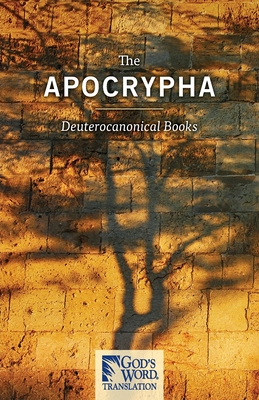The Apocrypha: GOD'S WORD Translation

The Apocrypha: GOD'S WORD Translation
In the GOD'S WORD Translation, the word apocrypha is used to designate the following writings: Tobit, Judith, Esther (the Greek version), Wisdom, Sirach, Baruch, the Letter of Jeremiah, The Prayer of Azariah & the Song of the Three Young Men, Susanna, Bel & the Snake, First Maccabees, and Second Maccabees.
During the time of the Reformation, Martin Luther's German translation of the Bible contained these writings in an appendix located at the end of the Old Testament. Luther gave them the title "Apocrypha" and wrote that these writings are "books which are not held equal to the Holy Scriptures yet are profitable and good to read." Afterward, most Protestant Bible translations followed Luther by separating these books from the rest of Holy Scripture and giving them the designation "Apocrypha." Even today Protestants do not consider these books to be part of the canon of Holy Scripture.
On April 8, 1546, at the Council of Trent, the Roman Catholic Church officially declared the Apocrypha to be inspired, authoritative, and equal with the books of the Old Testament. At this council, the books of the Apocrypha were given the designation "Deuterocanonical." This designation indicates that these books are part of the canon of Holy Scripture and that their canonical status was decided at a later date than the other Old Testament books, which are called protocanonical.
Despite the two different opinions on the degree of authority that should be given to these books, most Christians agree that these books are valuable. Because these books were written in the inter-testamental period, they provide helpful information regarding the life and thought of the Jewish people during an important period of Jewish history. These books offer insight into Jewish history, beliefs, and religious practices immediately prior to the birth of Jesus. People who read them will be better able to understand the political, cultural, ethical, and religious background of Jesus' contemporaries. Also, these books are valuable because they emphasize the fact that God protects and guides his chosen people, and they encourage God's people to follow his teachings and trust his promises.
132.18Lei
132.18Lei
Livrare in 2-4 saptamani
Descrierea produsului
In the GOD'S WORD Translation, the word apocrypha is used to designate the following writings: Tobit, Judith, Esther (the Greek version), Wisdom, Sirach, Baruch, the Letter of Jeremiah, The Prayer of Azariah & the Song of the Three Young Men, Susanna, Bel & the Snake, First Maccabees, and Second Maccabees.
During the time of the Reformation, Martin Luther's German translation of the Bible contained these writings in an appendix located at the end of the Old Testament. Luther gave them the title "Apocrypha" and wrote that these writings are "books which are not held equal to the Holy Scriptures yet are profitable and good to read." Afterward, most Protestant Bible translations followed Luther by separating these books from the rest of Holy Scripture and giving them the designation "Apocrypha." Even today Protestants do not consider these books to be part of the canon of Holy Scripture.
On April 8, 1546, at the Council of Trent, the Roman Catholic Church officially declared the Apocrypha to be inspired, authoritative, and equal with the books of the Old Testament. At this council, the books of the Apocrypha were given the designation "Deuterocanonical." This designation indicates that these books are part of the canon of Holy Scripture and that their canonical status was decided at a later date than the other Old Testament books, which are called protocanonical.
Despite the two different opinions on the degree of authority that should be given to these books, most Christians agree that these books are valuable. Because these books were written in the inter-testamental period, they provide helpful information regarding the life and thought of the Jewish people during an important period of Jewish history. These books offer insight into Jewish history, beliefs, and religious practices immediately prior to the birth of Jesus. People who read them will be better able to understand the political, cultural, ethical, and religious background of Jesus' contemporaries. Also, these books are valuable because they emphasize the fact that God protects and guides his chosen people, and they encourage God's people to follow his teachings and trust his promises.
Detaliile produsului










